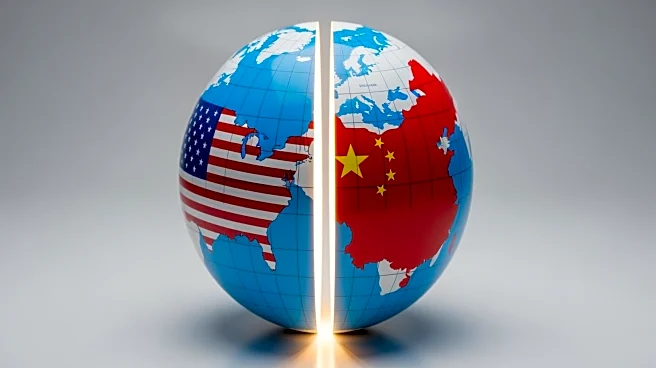What's Happening?
The United States and China are set to engage in another round of trade talks next week in Malaysia, as tensions over tariffs continue to simmer. US Treasury Secretary Scott Bessent and Chinese Vice-Premier
He Lifeng will lead the negotiations, aiming to de-escalate the ongoing trade conflict between the two largest global economies. This development follows a virtual meeting between Bessent and He, described as 'frank and detailed.' The talks are part of a broader effort to prepare for a potential meeting between President Trump and Chinese President Xi Jinping, which is expected to occur in South Korea during the Asia-Pacific Economic Cooperation summit. The discussions come in the wake of President Trump's recent threat to impose a 100 percent import surtax on Chinese goods, set to take effect on November 1. However, Trump has also expressed optimism about reaching an agreement to defuse the crisis, characterizing the high tariffs as 'not sustainable.'
Why It's Important?
The outcome of these trade talks holds significant implications for the global economy, as the US-China trade relationship is a major driver of international commerce. A failure to reach an agreement could exacerbate economic tensions, potentially leading to a full-blown trade war that might disrupt global supply chains and impact economic growth worldwide. The talks are crucial for industries reliant on the flow of goods between the two nations, particularly those involving rare-earth elements, which are critical for various high-tech and defense applications. A resolution could stabilize markets and provide a framework for future economic cooperation, benefiting businesses and consumers alike by potentially lowering costs and increasing market access.
What's Next?
The upcoming talks in Malaysia are expected to set the stage for a high-level meeting between President Trump and President Xi. The outcome of these discussions could influence the direction of US-China trade policies and impact global economic stability. Stakeholders, including multinational corporations and financial markets, will be closely monitoring the negotiations for any signs of progress or further escalation. The expiration of the current trade truce in November adds urgency to the talks, as both sides seek to avoid the imposition of new tariffs that could further strain economic relations.









